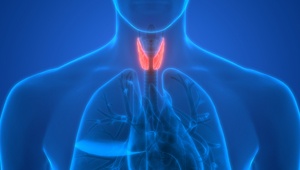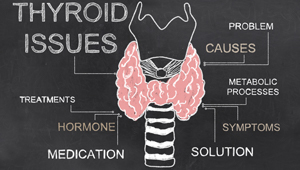Thyroid Treatments – Richardson, TX
Maintain metabolic balance and overall good health

Still waters run deep. That adage can be used to describe your thyroid, a gland in your neck that quietly regulates several bodily systems with hormones. Hormones are chemicals that glands in the endocrine system produce. These hormones move through your bloodstream to tissues and organs, delivering messages that tell the organs what to do and when to do it. If this gland does not function properly, then thyroid treatments from our team at Richardson Pain and Wellness may be necessary in order to restore metabolic balance and well-being.
What Is the Thyroid?

The thyroid is a butterfly-shaped endocrine gland located in the lower front of the neck. Thyroid hormones are produced here and then secreted into the bloodstream, where they are carried throughout the body. Thyroid hormone is essential to the body’s proper use of energy and ability to stay warm, as well as to keep your heart, brain, muscles and other organs working well.
How Does the Thyroid Gland Work?

The thyroid is one of your endocrine system’s glands that produce, store and release hormones into the bloodstream. Your thyroid uses iodine from foods you eat—for example, table salt often has iodine added—to produce two main hormones: triiodothyronine (T3) and thyroxine (T4). T3 and T4 need to be at correct levels, not too high and not too low. The hypothalamus and pituitary glands in your brain help T3 and T4 balance.
What Are the Symptoms of Low T3?
Thyroid dysfunction can be diagnosed with a simple blood test. Your doctor may order a test to determine if you have:
Hyperthyroidism—your thyroid produces too much thyroid hormone
Hypothyroidism—your thyroid does not produce enough thyroid hormone
Symptoms of low T3 include:
- Difficulty sleeping
- Fatigue and daytime drowsiness
- Trouble concentrating
- Dry skin and hair
- Depression
- Sensitivity to cold temperature
- A heavy menstrual cycle
- Joint and muscle pain
What Is T3 Replacement Therapy?
If tests show that your levels of T3 are abnormally low, then this may indicate hypothyroidism. It may also be a sign of a long-term illness, because T3 levels drop when you are ill.
Although most actions of thyroid hormone are the result of T3, most T3 in the body comes from the conversion of T4. Patients with hypothyroidism typically have normal conversion of T4 to T3. T3 has a short life span in the body, but T4 lasts much longer, thereby ensuring a steady supply of T3.
The goal of hormone therapy is to mimic normal thyroid function. Synthetic thyroxine, or T4, works just like your own thyroid hormone would. During replacement therapy, your thyroid function is monitored to ensure you are taking the correct dosage.

